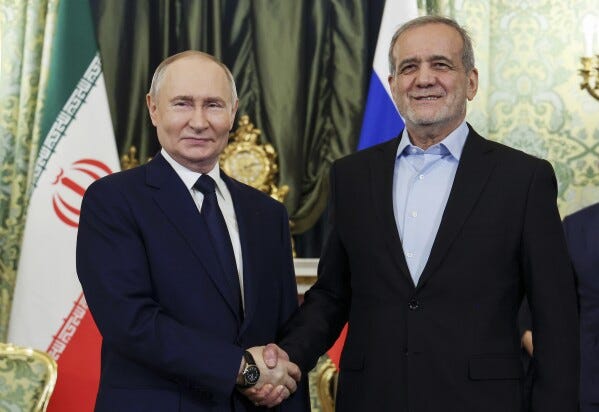What lies behind the "comprehensive strategic partnership" formalized by Russia and Iran?
The Iranian president visits Moscow today to sign an agreement solidifying Russo-Iranian relations. This partnership bears the same name as the one signed with North Korea last June.

This Friday, Russia and the Islamic Republic of Iran will cement their relations for the next two decades. Iranian President Masoud Pezeshkian is expected in Moscow, where he will meet with his counterpart, Vladimir Putin, to sign a "comprehensive strategic partnership." While the specifics remain vague and the details are expected to remain confidential, the agreement is said to encompass “economic and trade cooperation in the fields of energy, environmental issues, and matters of defense and security,” according to a statement last week from the Iranian embassy in Russia on Telegram.
According to the London-based news outlet Middle East Eye, which cites an Iranian government source, the deal was reached after 20 to 30 rounds of negotiations and comprises 47 articles addressing a wide range of domains. A significant aspect involves logistics: Russia is particularly keen on developing a rail and maritime corridor connecting Moscow, Baku, and Tehran, allowing it to bypass Western sanctions and redirect exports toward Asia. "In terms of energy, the Iranians are especially interested in Russian investments in the gas sector, though many announcements have been made recently without anything materializing so far," explains Igor Delanoë, deputy director of the French-Russian Observatory and an associate researcher at the Institute for International and Strategic Relations (IRIS).
Filling critical gaps
A significant portion of the agreement is expected to involve military cooperation. “Both sides currently rely on each other to address critical weaknesses, while recognizing that a crucial third player—China—is absent from this deal,” says Stéphane Audrand, an international risk consultant and military specialist. Russia, for its part, needs Iran’s manufacturing capabilities, particularly in the production of drones and missiles.
On the military front, Iran, under embargo and sanctions for four decades, is in dire need of Russian weaponry. “To put it bluntly, Iran’s air defense is full of gaps; its missiles are outdated, its radar systems are both antiquated and insufficient in number, and its fighter aviation is utterly obsolete,” Audrand continues. Strategically, Iran is also in a precarious regional position following a series of setbacks over the past year. The most recent? The collapse of the so-called "resistance axis" after the fall of Bashar al-Assad’s regime in Syria.
Technology transfers
“For now, the Russians have shown caution in supplying arms to Iran,” notes Igor Delanoë. “Primarily because they need the equipment for the war in Ukraine, but also because they maintain pragmatic ties with Israel. That said, I wouldn’t be surprised if the Iranians receive some equipment—not in large quantities, but of notable quality.” This cooperation might also include technology transfers in missile development or aerospace, areas where Russia has significant expertise, as well as formalizing intelligence-sharing. "As for nuclear cooperation, that’s purely speculative,” Audrand continues. “But even on the conventional front, significant technology transfers are already happening.” In return, Russia may well expect Iran to ramp up certain aspects of its production.
Interestingly, this partnership carries the same title as the agreement signed last June between Vladimir Putin and Kim Jong-un. Ratified last October by Russian lawmakers, that deal included a clause for "immediate military assistance" in the event of an armed attack by a third party. Since then, nearly 12,000 North Korean soldiers are reported to be fighting in Ukraine or the Kursk region, where Kyiv has been conducting incursions for several months. Could a similar assistance clause be included with Iran? “No, that would be far too risky for Moscow,” says Stéphane Audrand. “Russia is already overstretched and cannot afford to commit to a defense clause that would require it to take up arms for Iran. Especially since Iran’s potential adversaries are the United States and Israel—two countries Russia has no desire to engage with due to the risk of escalation.”
The signing of this agreement replaces a previous one that expired in 2021, its renewal delayed by the pandemic and the death of former Iranian President Ebrahim Raisi last May. Symbolically, it is a public affirmation of ties between two nations that already collaborate extensively behind closed doors—a strategic communication move on the eve of Donald Trump’s inauguration?



